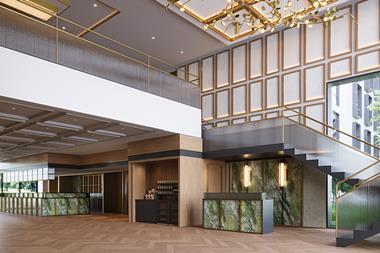Changing consumer demands and a renewed focus on sustainable tourism has forced designers and developers to adapt their approach, according to global design experts from Perkins&Will and Accor.
Neil Andrew and Federico Toresi joined Blackstock’s Andrew Teacher and Tamar van der Hoek to discuss where the hotel industry goes from here.
You can listen to this podcast via Apple Podcastsor Spotifyor SoundCloudor listen to it through the player below:
It is an uncontroversial fact that the hotel industry was one of the sectors most badly hit by the pandemic. Almost overnight, foreign travel dried up, business trips to cities ceased, and consumers of all stripes were forced to stay at home. The sector has rallied and has started to bounce back strongly - but the pandemic still has a lingering impact that cannot be ignored.
Guests’ demands have changed significantly since the pandemic. “In luxury, we’ve seen a big shift away from sumptuous rooms with artisanal products,” explains Federico Toresi, global vice president of design, luxury and premium brands, at Accor. “Our guests want to feel different experiences they can take away with themselves in their minds and hearts, rather than going home with a bag full of goodies.”
Neil Andrew, head of hospitality at Perkins&Will, agrees that guests are now demanding a greater emphasis on immersive experiences. Guests want to feel that the hotel is an extension of the outside world, rather than something separate from it. “Hospitality’s shifted,” he says. “Now, we want to encourage people to go out and explore the local area. It’s more about the experiences than the possessions itself.”
Going forward, hotels will continue to become even more interconnected to the community in which they are situated. “We’re looking at adapting hotels to become focal points of the community,” Toresi explains, “by opening their doors and allowing the neighbourhood to come in. It’s a guest-driven, demand-driven service that we want to provide.”
Andrew and Toresi had a chance to demonstrate their commitments and design philosophy through the creation of Sleep Set 2035. In this collaborative project for Sleep and Eat, the designers were given the task of depicting the hotel room of the future.
The project gave the designers a chance to explore the themes that resonate most with the guests of today, and which will only become more important to the guests of tomorrow. “The pillars that we worked around were wellness, sustainability and future hidden technology,” says Andrew.
During the project, Andrew’s team at Perkins&Will began to research sustainable materials, many of which have been included in Perkins&Will’s Now Database; a comprehensive database of products that contains valuable information to be used in future design projects, ensuring sustainability can be achieved in every aspect of the schemes.
“We now have a database now with around 300 suppliers,” says Andrew. “One of the main hurdles in sustainable design is the cost, and a large part of the cost would be the time that designers spend researching the materials. If you’ve already carried out that process, it helps us to remove part of that cost. It’s a very valuable process.”
Toresi adds that it’s important to ensure that the concept of sustainability is baked into every aspect of the design process. “We are not only looking at cutting the distance between the source and the hotel,” he comments. “We are also looking at creating a philosophy that can directly respond to environmental demands.”
Only by embracing technology can actors in the hotel and property sectors ensure that their design processes are fully sustainable. Andrew strongly endorses the potential of material passports. “Every item in a hotel should have a passport that tells you where it’s come from,” he says. “So when you demolish the building, you know exactly what’s in it, and where it can go.” This will allow materials to be reused effectively, adding very little to developers’ carbon footprint.
However, technology will not be enough to tackle the climate crisis. Comprehensive, binding legislation can be the push that drives developers into action. “The biggest power we have,” says Toresi, “is to demand that there are certain rules we can adhere to. And then we need to be supported by governments locally to make sure they are being enforced.”
At the end of the day, despite the promise of technology, it’s the people holding the tools who can make the most difference. “It’s about making sure our network understands that the whole planet is moving towards a dangerous phase,” says Toresi. “Purchasing power is one thing, but people power is vital. That’s the power we need to try and change the whole economy.”
You can listen to this podcast via Apple Podcastsor Spotifyor SoundCloudor listen to it through the player above.






























No comments yet